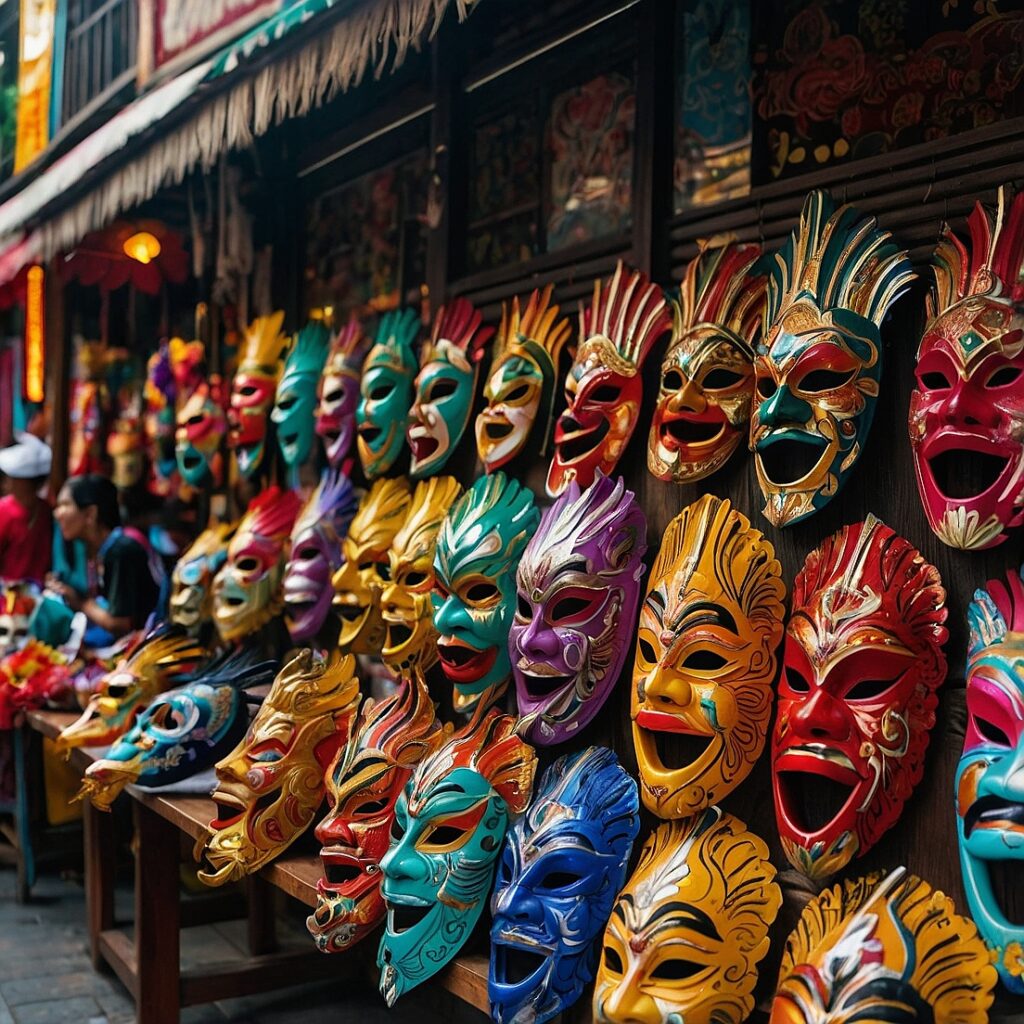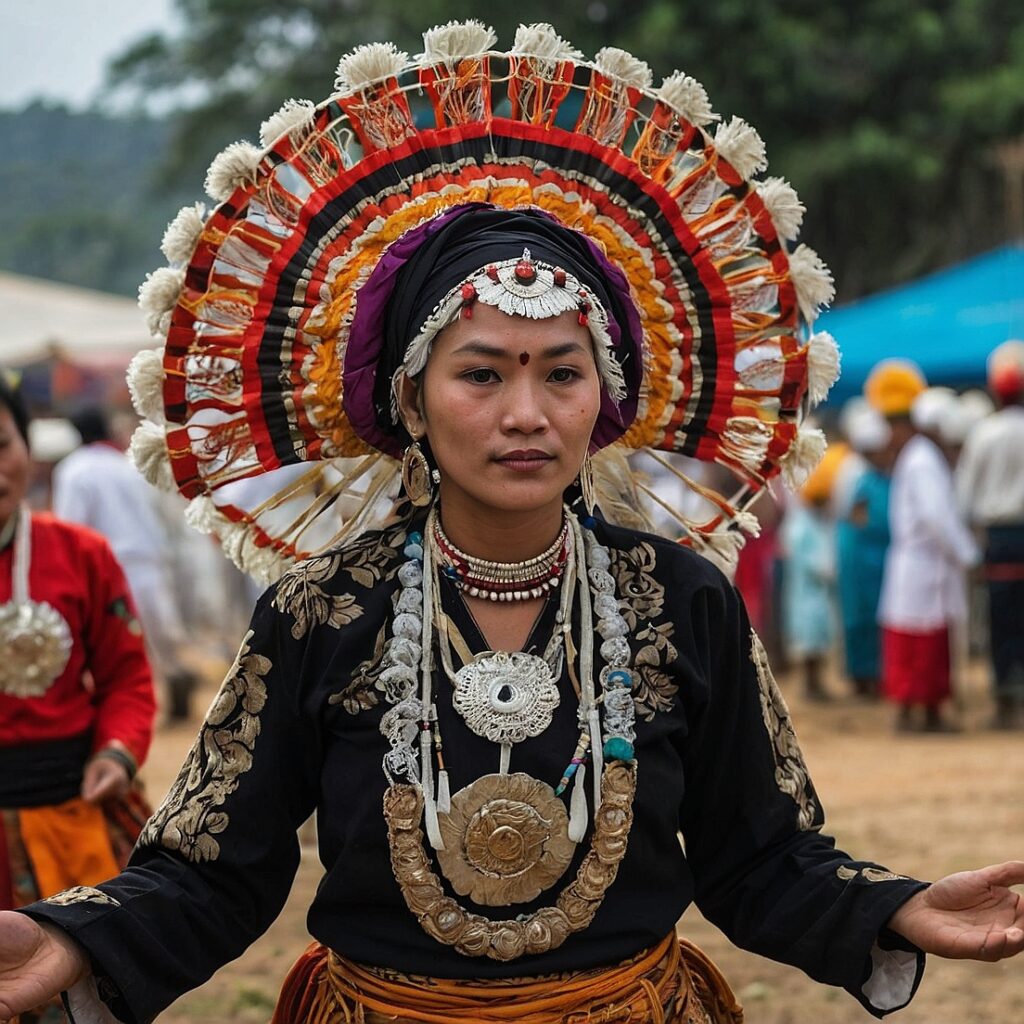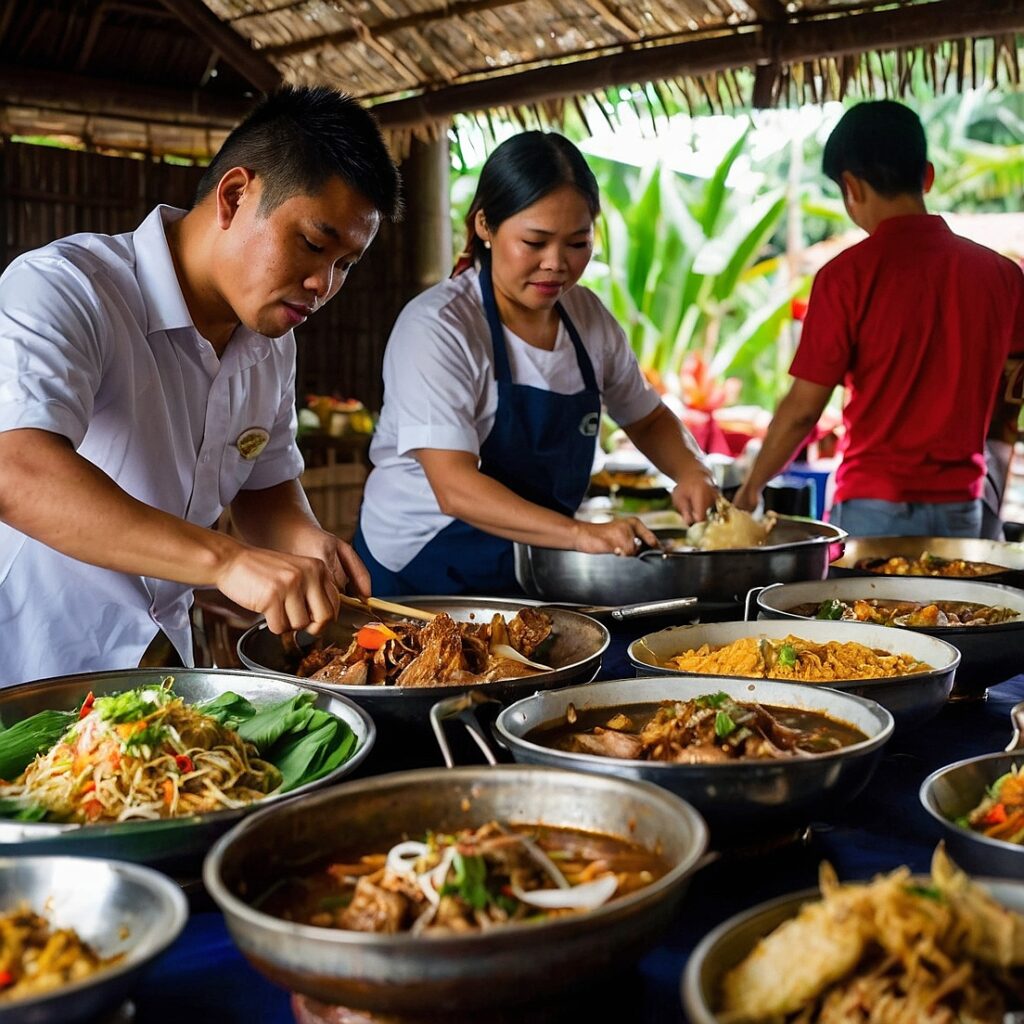Have you ever been to a festival that’s so vibrant and colorful, it feels like you’ve stepped into a living painting? That’s exactly what the Masskara Festival in Bacolod City, Philippines, is all about! This annual celebration, known for its dazzling array of smiling masks, is a feast for the senses and a treasure trove of unique souvenirs. Today, we’re diving into the world of Masskara memorabilia, exploring the best keepsakes you can bring home to keep the festival spirit alive long after the music fades and the confetti settles.
The Masskara Festival isn’t just any ordinary event – it’s a cultural phenomenon that has been captivating locals and tourists alike since 1980. Born out of a period of economic hardship, this festival has evolved into a symbol of resilience, joy, and creativity. Every October, the streets of Bacolod come alive with a riot of colors, pulsating music, and the infectious energy of smiling masked dancers. But what makes this festival truly special is the array of souvenirs that allow you to take a piece of this magic home with you.
The Star of the Show: Masskara Masks
The Heart and Soul of the Festival
Let’s start with the obvious star of the show – the Masskara masks! These aren’t just any masks; they’re the beating heart of the festival, each one a unique work of art that tells a story. The word “Masskara” itself is a clever play on words, combining “mass” (a crowd) and “cara” (the Spanish word for face). It’s also a pun on “maskara,” the Filipino word for mask. Clever, right?
These masks are more than just festival props – they’re intricate pieces of craftsmanship that local artisans pour their hearts and souls into. Typically adorned with feathers, beads, and sequins, each mask sports a wide, beaming smile that perfectly captures the spirit of Bacolod, the “City of Smiles.” When you bring one of these masks home, you’re not just buying a souvenir; you’re acquiring a piece of Filipino artistry and culture.
Varieties to Choose From
Now, here’s where it gets exciting for souvenir hunters like us. Masskara masks come in all shapes, sizes, and styles. Here’s a quick rundown of what you might find:
- Full-sized Festival Masks: These are the real deal – the actual masks worn by dancers during the festival. They’re large, ornate, and make for stunning wall decorations.
- Miniature Masks: Perfect for those who want a taste of Masskara without dedicating an entire wall to it. These smaller versions capture all the details of their larger counterparts but in a more compact form.
- Mask-inspired Jewelry: For a subtler nod to the festival, look out for earrings, necklaces, and brooches shaped like tiny Masskara masks.
- DIY Mask Kits: Feeling crafty? Some vendors sell kits that let you decorate your own mask, giving you a hands-on experience of the festival’s artistic spirit.
Beyond the Mask: Other Must-Have Souvenirs
Wearable Memories
While masks are the undisputed icons of the festival, there’s so much more to bring home from Masskara. Let’s talk about wearable souvenirs that let you carry a bit of festival flair wherever you go.
T-shirts are always a popular choice, and Masskara doesn’t disappoint. Look for vibrant designs featuring mask motifs, festival scenes, or quirky slogans that capture the event’s jovial spirit. But why stop at tees? You’ll also find an array of accessories like colorful bandanas, caps, and even shoes decorated with Masskara-inspired designs. Imagine rocking a pair of sneakers with tiny smiling masks – now that’s a conversation starter!
For those who prefer a more subtle nod to their Masskara experience, keep an eye out for beautiful hand-woven textiles. The Negros region, where Bacolod is located, is known for its skilled weavers who create intricate patterns inspired by local culture. A scarf or shawl made from these fabrics is not just a souvenir, but a piece of wearable art that connects you to the rich textile traditions of the Philippines.
Tasty Treats to Take Home
No festival experience is complete without indulging in local delicacies, and Masskara offers plenty of opportunities to satisfy your sweet tooth and bring some flavors home. Bacolod is famous for its sugarcane industry, which translates into some seriously delicious sweets and pastries.
One local favorite you shouldn’t miss is the “piaya” – a flatbread filled with muscovado sugar. It’s crispy, sweet, and utterly addictive. Many vendors sell packaged piayas that make for perfect gifts or a tasty reminder of your Masskara adventure. Another must-try is the “napoleones,” a layered pastry filled with custard cream that’s often described as Bacolod’s version of the mille-feuille.
For those who prefer savory souvenirs, look out for bottles of local condiments like sinamak (spiced vinegar) or jars of kalamansi (local citrus) marmalade. These unique flavors will transport you right back to the streets of Bacolod with every taste.
Artisanal Crafts: Supporting Local Talent
Handmade with Heart
One of the best things about festival souvenirs is that they often support local artisans and small businesses. The Masskara Festival is a showcase of Bacolod’s creative talent, and you’ll find a wide array of handcrafted items that make for meaningful souvenirs.
Keep an eye out for intricately carved wooden items, from small figurines of masked dancers to larger decorative pieces. These often feature not just Masskara motifs but also other elements of Filipino culture, making them beautiful and educational keepsakes.
Pottery is another area where local artisans shine. You might find ceramic mugs, plates, or decorative items adorned with festival-inspired designs. Imagine sipping your morning coffee from a hand-painted Masskara mug – it’s like starting each day with a little burst of festival joy!
Sustainable Souvenirs
In recent years, there’s been a growing focus on eco-friendly and sustainable souvenirs, and Masskara is no exception. Look for items made from recycled or upcycled materials – you might be surprised at how creative local artisans can be!
Some clever souvenirs to watch for include:
- Tote bags made from recycled festival banners
- Jewelry crafted from repurposed materials
- Notebooks with covers made from pressed sugarcane fibers (a nod to Bacolod’s sugar industry)
These sustainable souvenirs not only reduce waste but also serve as a reminder of the festival’s ability to adapt and innovate – much like the resilient spirit that gave birth to Masskara in the first place.
Capturing Memories: Photography and Art
Picture Perfect
In today’s digital age, some of the best souvenirs are the photos and videos we capture. The Masskara Festival, with its explosion of colors and constant movement, is a photographer’s dream. While not a physical souvenir you can buy, the images you capture are priceless mementos of your experience.
To take your photographic souvenirs to the next level, consider these ideas:
- Look for local photographers selling prints of festival scenes. These professional shots can capture angles and moments you might have missed.
- Create a photo book when you return home, combining your personal photos with tickets, flyers, and other paper memorabilia from the festival.
- Share your photos on social media using official festival hashtags – it’s a great way to connect with other Masskara enthusiasts and relive the experience.
Art Inspired by Masskara
The festival’s vibrant atmosphere has inspired many local artists, and you’ll find a variety of paintings, sketches, and prints depicting Masskara scenes. These range from realistic portrayals of masked dancers to more abstract interpretations of the festival’s energy and spirit.
Purchasing a piece of Masskara-inspired art is more than just buying a souvenir – it’s investing in the local art scene and taking home a unique interpretation of the festival. Plus, it’s a great way to add a pop of color and culture to your home decor!
The Digital Age: Virtual Souvenirs
Masskara Goes Digital
In our increasingly digital world, even traditional festivals like Masskara are adapting. While physical souvenirs have their charm, don’t overlook the world of digital mementos. Many of these are free or low-cost, making them great options for budget-conscious travelers or those who prefer minimalist souvenirs.
Some digital souvenirs to consider:
- Festival Apps: Some editions of the Masskara Festival have released official apps with interactive maps, event schedules, and even virtual mask try-ons. Keeping these on your phone is a fun way to revisit your experience.
- E-books and Digital Guides: Look for downloadable guides about the festival’s history, mask-making techniques, or even Bacolod travel tips. These are lightweight souvenirs packed with information.
- Virtual Reality Experiences: As technology advances, some festivals are experimenting with VR. While not widely available yet, keep an eye out for virtual tours or 360-degree videos of Masskara that let you “revisit” the festival from home.
- Digital Stickers and Filters: Social media platforms often create special stickers or filters for major events. Saving these to your collection lets you add a touch of Masskara to your online presence year-round.
Souvenir Shopping Tips: Making the Most of Your Masskara Experience
When and Where to Shop
Now that we’ve covered the “what” of Masskara souvenirs, let’s talk about the “when” and “where.” The festival typically runs for several weeks in October, but souvenir shopping isn’t limited to just this period. Here are some tips to help you snag the best mementos:
- Pre-Festival Shopping: Many souvenir shops start stocking up on Masskara items weeks before the official start. Shopping early can help you avoid crowds and ensure a better selection.
- During the Festival: This is when you’ll find the widest variety of souvenirs, especially at the official festival marketplaces. However, be prepared for higher prices and larger crowds.
- Post-Festival Deals: If you’re not in a hurry, hanging around for a day or two after the festival can lead to some great bargains as vendors look to clear out their stock.
As for where to shop, here are some popular spots:
- The Masskara Marketplace: Usually set up in the city center during the festival, this is your one-stop shop for all things Masskara.
- Local Art Galleries: For higher-end souvenirs and artwork.
- SM City Bacolod: This shopping mall often has special Masskara sections during festival season.
- Public Market: For more traditional and often cheaper options.
Bargaining and Buying Tips
Haggling is a common practice in many Filipino markets, including some souvenir stalls at Masskara. Here are some friendly tips to help you get the best deals:
- Always be polite and smile – remember, you’re in the City of Smiles!
- Don’t be afraid to walk away if the price isn’t right. Often, vendors will call you back with a better offer.
- Buying multiple items from the same vendor can often lead to better discounts.
- Keep small bills handy. Vendors appreciate not having to make change for large notes.
The Impact of Souvenirs: More Than Just Mementos
Supporting the Local Economy
When you purchase souvenirs from the Masskara Festival, you’re doing more than just acquiring keepsakes. You’re directly contributing to the local economy of Bacolod City. The festival is a significant economic driver for the region, providing income for artisans, small business owners, and the tourism industry at large.
Let’s look at some numbers to understand the impact:
| Year | Estimated Visitors | Approximate Economic Impact |
|---|---|---|
| 2018 | 210,000 | PHP 2.1 billion |
| 2019 | 225,000 | PHP 2.3 billion |
| 2020 | Virtual Edition | Limited Impact |
| 2021 | Hybrid Format | Partial Recovery |
As you can see, the festival has a substantial economic footprint, and your souvenir purchases play a part in this positive impact.
Preserving Culture Through Souvenirs
Beyond the economic aspect, Masskara souvenirs play a crucial role in preserving and promoting Filipino culture. Each mask, handicraft, or artistic representation serves as a tangible link to the traditions and creativity of Bacolod and the wider Philippines.
By bringing these items home and sharing their stories, you become an ambassador for Filipino culture. You’re not just decorating your space; you’re opening up conversations about the Philippines, its festivals, and its people. In a world where global understanding is more important than ever, these small cultural exchanges can make a big difference.
The Lasting Magic of Masskara Souvenirs
As we wrap up our journey through the world of Masskara souvenirs, it’s clear that these items are so much more than just things to buy. They’re pieces of art, cultural artifacts, and most importantly, tangible memories of an extraordinary experience.
Whether you choose a grand, feathered mask to hang on your wall, a simple t-shirt to wear on casual days, or a digital photo album to flip through on your phone, each souvenir carries with it a piece of the Masskara spirit. It’s a reminder of the joy, creativity, and resilience that this festival represents.
So the next time you find yourself in Bacolod during the Masskara season, take a moment to really appreciate the souvenirs around you. Each one tells a story – of skilled artisans, of cultural pride, of a city that chose to face adversity with a smile. And when you bring that souvenir home, you’re not just decorating your space; you’re keeping the spirit of Masskara alive, one smiling mask at a time.
Remember, the best souvenir is the one that speaks to you, that captures your personal Masskara experience. So whether you go all out with a full-sized mask or keep it simple with a keychain, make sure it’s something that will make you smile every time you see it. After all, isn’t that what Masskara is all about?
Disclaimer: This article is based on information available up to 2021. While we strive for accuracy, details about the Masskara Festival and associated souvenirs may have changed since then. We encourage readers to verify current information and report any inaccuracies so we can correct them promptly. Your feedback helps us maintain the quality and relevance of our content.




